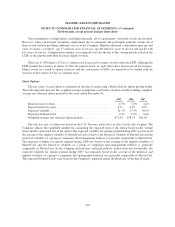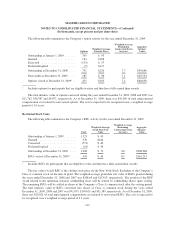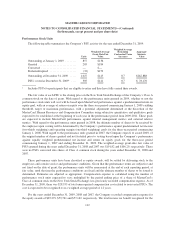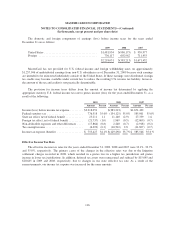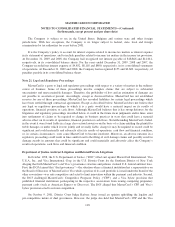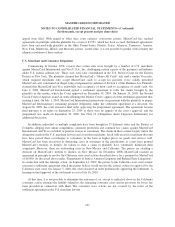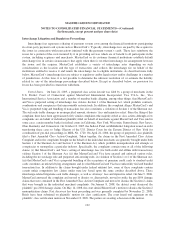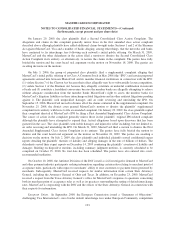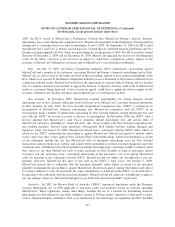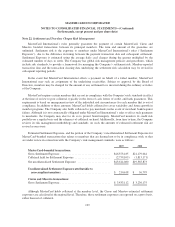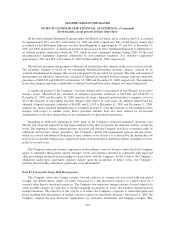MasterCard 2009 Annual Report Download - page 130
Download and view the complete annual report
Please find page 130 of the 2009 MasterCard annual report below. You can navigate through the pages in the report by either clicking on the pages listed below, or by using the keyword search tool below to find specific information within the annual report.MASTERCARD INCORPORATED
NOTES TO CONSOLIDATED FINANCIAL STATEMENTS—(Continued)
(In thousands, except percent and per share data)
On April 8, 2003, the trial court judge issued a final decision in the Schwartz matter. In his decision, the trial
judge found that MasterCard’s currency conversion process does not violate the Truth in Lending Act or
regulations, nor is it unconscionably priced under California law. However, the judge found that the practice is
deceptive under California law, and ordered that MasterCard mandate that members disclose the currency
conversion process to cardholders in cardholder agreements, applications, solicitations and monthly billing
statements. As to MasterCard, the judge also ordered restitution to California cardholders. The judge issued a
decision on restitution on September 19, 2003, which requires a traditional notice and claims process in which
consumers have approximately nine months to submit their claims. The court issued its final judgment on
October 31, 2003. On December 29, 2003, MasterCard appealed the judgment. The final judgment and restitution
process were stayed pending MasterCard’s appeal. On August 6, 2004, the court awarded plaintiff’s attorneys’
fees and costs in the amount of $28,224 to be paid equally by MasterCard and Visa. Accordingly, during the
three months ended September 30, 2004, MasterCard accrued amounts totaling $14,112. MasterCard
subsequently filed a notice of appeal on the attorneys’ fee award on October 1, 2004. With respect to restitution,
MasterCard believed that it was likely to prevail on appeal. In February 2005, MasterCard filed an appeal
regarding the applicability of Proposition 64, which amended sections 17203 and 17204 of the California
Business and Professions Code, to this action. On September 28, 2005, the appellate court reversed the trial
court, finding that the plaintiff lacked standing to pursue the action in light of Proposition 64. On May 8, 2007,
the trial court dismissed the case.
MasterCard International, Visa U.S.A., Inc., Visa International Corp., several member banks including
Citibank (South Dakota), N.A., Chase Manhattan Bank USA, N.A., Bank of America, N.A. (USA), MBNA, and
Citicorp Diners Club Inc. are also defendants in a number of federal putative class actions that allege, among
other things, violations of federal antitrust laws based on the asserted one percent currency conversion “fee.”
Pursuant to an order of the Judicial Panel on Multidistrict Litigation, the federal complaints have been
consolidated in MDL No. 1409 before Judge William H. Pauley III in the U.S. District Court for the Southern
District of New York. In January 2002, the federal plaintiffs filed a Consolidated Amended Complaint (“MDL
Complaint”) adding MBNA Corporation and MBNA America Bank, N.A. as defendants. This pleading asserts
two theories of antitrust conspiracy under Section 1 of the Sherman Act: (i) an alleged “inter-association”
conspiracy among MasterCard (together with its members), Visa (together with its members) and Diners Club to
fix currency conversion “fees” allegedly charged to cardholders of “no less than 1% of the transaction amount
and frequently more”; and (ii) two alleged “intra-association” conspiracies, whereby each of Visa and
MasterCard is claimed separately to have conspired with its members to fix currency conversion “fees” allegedly
charged to cardholders of “no less than 1% of the transaction amount” and “to facilitate and encourage
institution—and collection—of second tier currency conversion surcharges.” The MDL Complaint also asserts
that the alleged currency conversion “fees” have not been disclosed as required by the Truth in Lending Act and
Regulation Z.
On July 20, 2006, MasterCard and the other defendants in the MDL action entered into agreements settling
the MDL action and related matters, as well as the Schwartz matter. Pursuant to the settlement agreements,
MasterCard paid $72,480 to be used for the defendants’ settlement fund to settle the MDL action and $13,440 to
settle the Schwartz matter. On November 8, 2006, Judge Pauley granted preliminary approval of the settlement
agreements, which were subject to both final approval by Judge Pauley and resolution of all appeals. On
November 15, 2006, the plaintiff in one of the New York state court cases appealed the preliminary approval of
the settlement agreement to the U.S. Court of Appeals for the Second Circuit. On November 3, 2009, Judge
Pauley signed a Final Judgment and Order of Dismissal granting final approval to the settlement agreements. On
November 20, 2009, the same plaintiff in the New York state cases filed notice of appeal of final settlement
approval in the MDL action. Within the time period for appeal in the MDL action, twelve other such notices of
120


